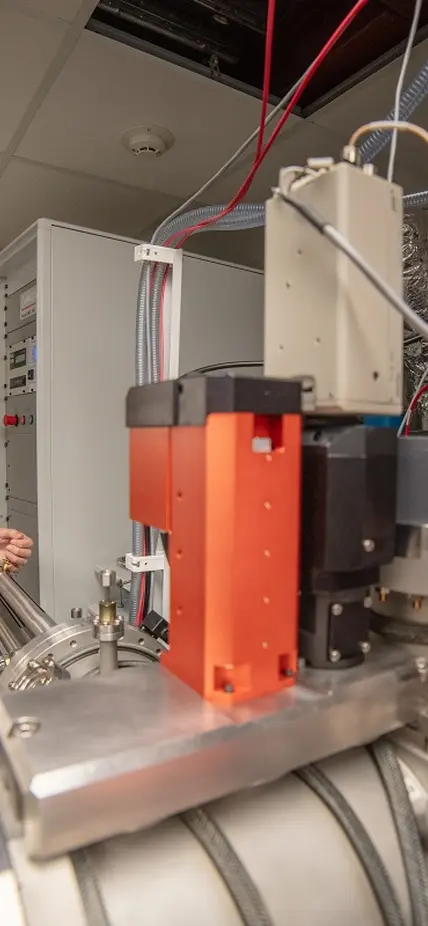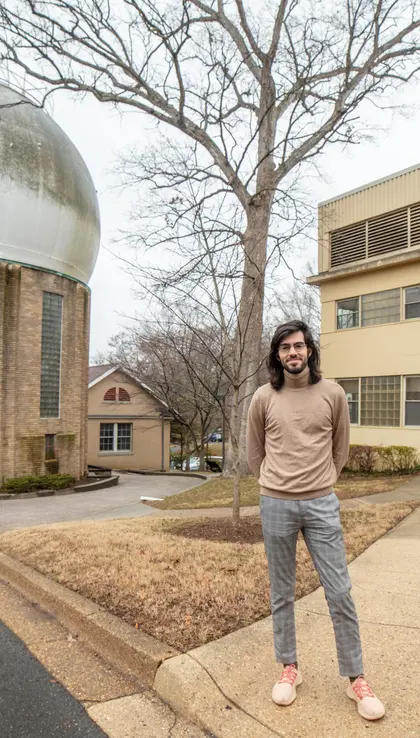
Q: What is your general area of study?
I study cosmochemistry, which examines the composition of matter in our Solar System. Many scientists in my field study the composition of meteorites, but my work revolves around micrometeorites—very tiny dust particles that are approximately the thickness of a strand of human hair. micrometeorites are a major source of extraterrestrial matter on Earth. There are many more of them than meteorites, and they have a lot to tell us a lot about the Solar System. What I study specifically is organic matter in micrometeorites, in which it can be much more abundant than in meteorites, in order to understand how this material formed. The cool thing is that with micrometeorites we are able to probe more remote objects of the Solar System, whereas with meteorites we are looking at regions closer to the Sun.
Q: What is the coolest thing you’ve worked on so far in your career?
Studying micrometeorites is incredible because most of them were stored in comets that evolved in the Solar System for billions of years, before being released and eventually drifting to Earth. It’s remarkable that we are able to recover and study these ancient particles that have been on this long journey through the Solar System. While micrometeorites fall everywhere on Earth, in most places it’s impossible to distinguish them from ordinary dust. But in the central regions of Antarctica there is virtually no human activity, so there is very little terrestrial dust. That means most of the dust recovered in that region is extra-terrestrial. To find this matter, cosmochemists from the Concordia collection (France) dig a trench and melt large volumes of snow. Then the water from the melted snow is filtered to recover the trapped particles. Any particles larger than 30 microns, will most likely be micrometeorites. We use a secondary electron microscope to verify that the particles have certain elements proving they come from space. Because these particles are rich in organic matter, we are able to use them to determine the chemical and isotopic compositions of organics, which provide evidence about where they are from and when they formed. While I’ve not yet been to Antarctica myself, I was able to bring samples from the Concordia collection with me to Carnegie.
Q: Did you always think you would be a scientist?
I didn’t grow up in a family of career scientists, but my grandmother was very interested in science and was always reading studies and books related to scientific matters. As a kid I was really fascinated by these books, and she and I talked quite a bit about them. I was about nine or 10 and that was really the beginning of my interest in science. At that time, I didn’t think about actually becoming a scientist. I was just curious and wanted to learn and understand a lot of different things. I have always been driven by curiosity. When I was in high school, I wanted to learn more about astrophysics, but it wasn’t until I was in undergrad that I started to realize that becoming a scientist was a realistic career path—that it was within my reach.
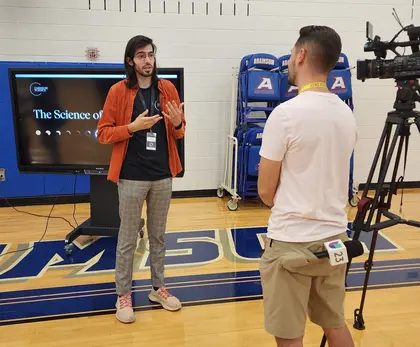
Q: Was your love of science shaped by a particular experience or mentor?
As I mentioned, my interest in science was initially sparked by my grandmother. And then I had some really great, dedicated teachers in high school. They prepared me and gave me the right tools to pursue science; they taught me to be rigorous and organized. They essentially set me up to succeed. Without that foundation, my scientific studies in university would have been a lot harder. I also had some amazing professors in undergrad. But it was really during my Ph.D. that I delved into the practical application of science. I got really lucky with my Ph.D. advisors, as well as some other individuals I worked with during that time, who were instrumental in teaching me how to do research—how to actually “do” science.
Q: Who is your “Science Superhero?”
I don’t have just one and don’t like the idea of naming a single “superhero,” because that implies that you have to be like that person to succeed. I like the idea of just being yourself and doing your best work and always striving to learn and push boundaries. That said, there are many people from different periods in my life who have had a positive influence on my career trajectory and who continue to impact me. The thing I like about research is that it’s a world in which you have to work with a lot of people with different views, ideas, interests, and approaches—everybody brings something different to the table and you can learn from all of them.
Q: Do you have a favorite meteorite and why?
I have a favorite type of micrometeorite, which are called ultracarbonaceous Antarctic micrometeorites. These particles are very rich in carbon, more than any other samples in the Solar System. And they are quite rare; there are only about 15 in the world. While we know some things about them, there is still so much to learn from them about organic matter and how it forms in the Solar System. They are very precious samples that can tell us a lot, so that’s why I would call them my favorite.
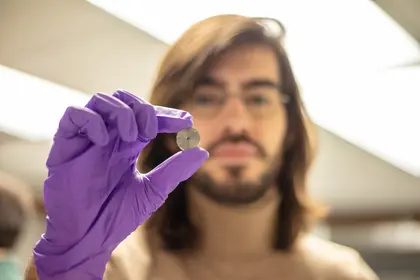
Q: What are some of the challenges you have encountered in your career so far and how did you address them?
I came from an astrophysics background, which is much less about handling samples. When I switched to cosmochemistry, which is more of an applied science, I had to learn how to do experiments and how to deal with the tangible aspects of experimental work. I had to adapt in the way I thought about science and it took me some time. I really like to learn new techniques, but the transition wasn’t easy in the beginning. I knew, though, that it was essential to get over that hump to pursue my career. Now I think it’s good that I came from an astrophysicist’s background because it offers me a different lens or point of view in my work as a cosmochemist.
In addition, what I do is extremely specialized, so there is a great risk of becoming so absorbed in my own field and research that I become myopic and am not able to see what’s happening in the larger world of science around me. I become hyper-focused on what I’m doing, so I have to make a concerted effort to learn about things outside of my own work and take interest in what others in my lab are doing. I think a way to address this is to change your environment from time to time—change labs or change where you work. That’s a great way to push yourself outside your comfort zone and learn new things. I feel it’s very important to be aware of and know something about what your colleagues are doing, and not solely focus on your own work. Otherwise, you’ll find yourself out of touch and existing in an isolated bubble. It goes back to curiosity with me, I always want to learn new things. I just have to remind myself to look up from what I am doing, change my vantage point, and view things with a wider angle.
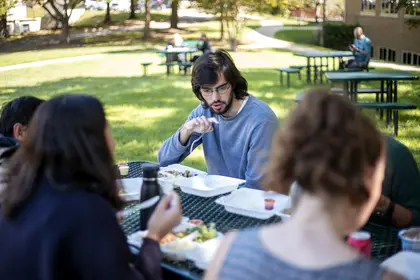
Q: What advice would you give to graduate students and others who are just starting their scientific careers?
Stay curious about the research going on in your field, beyond your own work, and never feel like you’re done learning. At every step in our careers, we still have a lot to learn. We can never know enough.
Another thing is that when we start our careers, it’s clear we’re pursuing research and science. But it can sometimes be easy to forget the human element; this is not a solitary path. In science and in the research world, you will meet and find yourself working with a range of personalities—people with different interests and different ways of communicating and behaving. Because all researchers are deeply committed to advancing, they can sometimes be emotional about their work and there are definitely egos involved. So, my advice is to be aware of this going in, and to learn how to interact and communicate with different kinds of people.
Q: What do you think is the most exciting research direction happening in your field right now? Looking 10 years ahead, what future development do you think will have the greatest impact on your field?
This year in the field of cosmochemistry, the most anticipated development was the OSIRIS- REx mission, a U.S. mission that probed the surface of an asteroid to retrieve samples and bring them back to earth to examine in labs. The importance of this mission lies in the fact that we know exactly where these samples came from. When we are working on meteorites or micrometeorite samples found on Earth, we have less context and limited information.
This is the second mission of its kind, coming two years after the Hayabusa2 mission, a similar mission done by the Japanese, where they also brought back samples from an asteroid.
These sample retrieval missions are the future of cosmochemistry and are crucial in allowing us to contextualize extraterrestrial matter and be able to learn about the Solar System on a much deeper level. I believe that in the next 10 years these missions will represent the greatest development and have the biggest impact on our field.
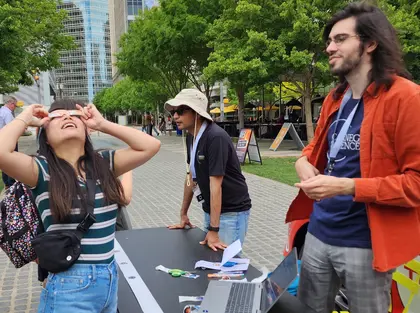
Q: Why did you decide to do a postdoctoral position at Carnegie?
I applied to Carnegie because it has a great reputation in cosmochemistry. It’s an institution that has a department in geochemistry, an applied science where you work with samples, as well as an astrophysics department. Cosmochemistry is a mix between these disciplines, so Carnegie is a great environment for people like me to research and interact with colleagues from both areas. And it offers so many resources and instruments that benefit our research.
Q: What has your experience at Carnegie meant to you?
Carnegie has really allowed me a lot of independence in my research. At other institutions as a new researcher, it’s hard to be able to work on what you want and be given your own space. I have the freedom at Carnegie to do that, while at the same time I’m surrounded by brilliant people who are supportive and always available if I need help, or want to discuss something, or have questions. It’s just an amazing place to grow as a scientist. Also, there are so many different areas of science being practiced at Carnegie, so I have this incredible opportunity to meet new people who can teach me things about different fields and techniques.
